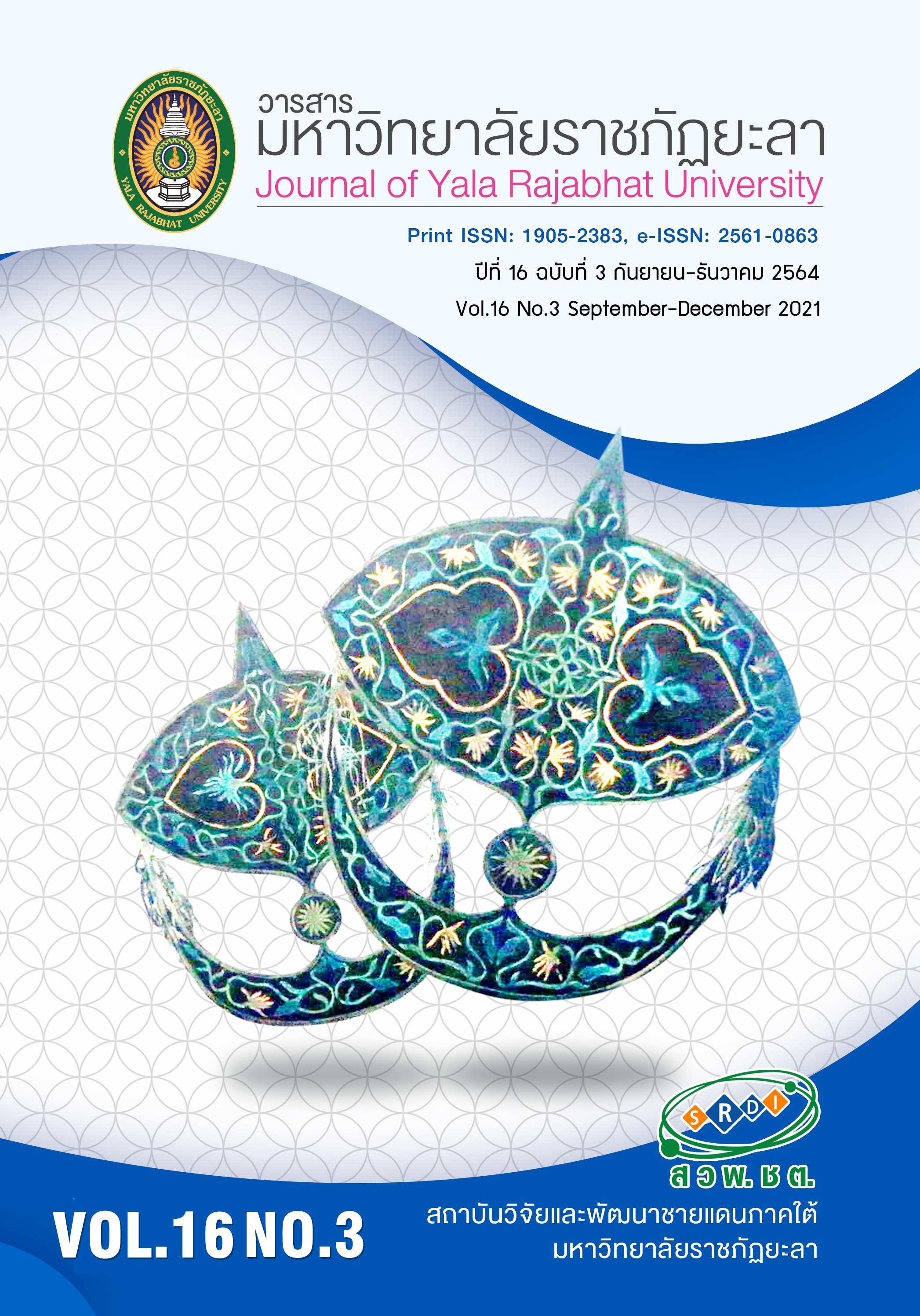การรับรู้ในเสน่ห์เมืองรองของประเทศไทยที่ส่งผลต่อความพึงพอใจในธุรกิจการประชุมองค์กรและการท่องเที่ยวเพื่อเป็นรางวัล
Main Article Content
บทคัดย่อ
เศรษฐกิจของโลกในปัจจุบันนั้น เมืองรองมีความสำคัญมากขึ้นและอุตสาหกรรมการประชุมถือเป็นกิจกรรมกระตุ้นการสร้างรายได้ให้กับเมืองและเปิดโอกาสให้สามารถรองรับนักเดินทางคุณภาพ งานวิจัยครั้งนี้เป็นการวิจัยแบบผสมผสาน เพื่อทำการศึกษาองค์ประกอบคุณลักษณะของเสน่ห์เมืองรองในประเทศไทยที่ส่งผลต่อความพึงพอใจในการทำธุรกิจการประชุมองค์กรและการท่องเที่ยวเพื่อเป็นรางวัล รวมถึงวิเคราะห์แนวทางการพัฒนาเมืองในการรองรับธุรกิจ สถิติที่ใช้ในการวิจัยเชิงปริมาณ คือ ค่าความถี่ ค่าร้อยละ ค่าเฉลี่ย ค่าเบี่ยงเบนมาตรฐาน และการถดถอยพหุคูณ มีการสัมภาษณ์เชิงลึกกึ่งโครงสร้างอย่างมีระบบ ผลการวิจัยพบว่า องค์ประกอบของคุณลักษณะในเสน่ห์เมืองรองที่ส่งผลต่อความพึงพอใจในธุรกิจประกอบด้วย ด้านความพร้อมและศักยภาพของเมืองรองมากที่สุด รองลงมาคือ ด้านส่วนประสมทางการตลาด 8Ps และแนวทางการบริหารจัดการเมืองรองประเทศไทยเพื่อรองรับธุรกิจโดยได้แนวคิดในรูปแบบ “SMART” คือ S-ความปลอดภัยและมาตรฐาน M-การตลาด ประชาสัมพันธ์และสร้างภาพลักษณ์ A-การเข้าถึงสถานที่สะดวก การสร้างโครงสร้างเครือข่ายพื้นฐาน R-ห้องพักและสถานที่จัดงาน T-แหล่งท่องเที่ยวโดดเด่นหลากหลายที่มีอัตลักษณ์
Article Details
บทความ ข้อมูล เนื้อหา รูปภาพ ฯลฯ ที่ได้รับการเผยแพร่ในวารสารมหาวิทยาลัยราชภัฏยะลานี้ ถือเป็นลิขสิทธิ์ของวารสารมหาวิทยาลัยราชภัฏยะลา หากบุคคลหรือหน่วยงานใดต้องการนำทั้งหมดหรือส่วนหนึ่งส่วนใดไปเผยแพร่ต่อหรือกระทำการใดๆ จะต้องได้รับอนุญาตเป็นลายลักษณ์อักษรจากวารสารมหาวิทยาลัยราชภัฏยะลาก่อนเท่านั้น
เอกสารอ้างอิง
Adisornprasert, W. (2019). Key success of Buriram model. [Online]. Retrieved August 11, 2020, from: https://intelligence.businesseventsthailand.com/en/blog/key-success-of-buriram-model. (in Thai)
Akkhaphin, S. (2016). An evaluation of the potential of Thailand as a MICE (Meeting, Incentives, Conventions, and Exhibitions) industry hub for the international convention industry in Asia (Doctoral dissertation, Liverpool John Moores University).
Celuch, K. (2013). The importance of meetings and incentive travel in times of economic growth for India and Poland. Tourism Role in The Regional Economy, 2013. Wroclaw; University of Business in Wroclaw. pp. 345-360.
Chuaysook, D., & Kovathanakul, D. (2015). Khonkaen MICE industry development towards leading MICE city of Thailand Journal of Thai Hospitality and Tourism, 10(1), 15-29. (in Thai)
Cieslikowski, K. (2018). Meeting industry in second tier cities. Innovative (eco-) technology, entrepreneurship and regional development. Conference proceedings, 2017. Katowice: University of Physical Education. No 2., 35-40.
Crouch, G. I., Del Chiappa, G., & Perdue, R. R. (2019). International Convention Tourism: A choice modelling experiment of host city competition. Tourism Management, 71, 530-542.
Department of Tourism. (2018). Tax deduction for second tier city [Online]. Retrieved April 20, 2020, from:
https://www.dot.go.th/content-sharing/content-sharing-detail/4. (in Thai)
Gračan, D., Sotošek, M. B., & Šerić, N. (2018). Changing trends In incentive travel. Biennial International Congress. Tourism & Hospitality Industry. April 26-27, 2018. Croatia: Faculty of Tourism & Hospitality Management, University of Rijeka.
Hang, H., Aroean, L., & Chen, Z. (2020). Building emotional attaching during COVID-19. Annals of Tourism Research.
Hoque, M. E. (2016). MICE Destinations branding from corporate branding perspective. Procedia-Social and Behavioral Sciences, 219, 307-315.
Houdement, J., Santos, J. A. C., & Serra, F. (2017). Factors affecting the decision-making process when choosing an event destination: A comparative approach between Vilamoura (Portugal) and Marbella (Spain). Journal of Spatial and Organizational Dynamics, 5(2), 127-145
Huo, Y. (2014). Meeting planners’ perception on convention destination attributes: Empirical Evidence from Six Major Asian Convention Cities. The Journal of Business Inquiry, 13(2), 74-84.
Jaisom, P., Toopgrajank, S., Charoenwiriyakul, C., Boonpadung, P., & Tipayatikumporn, U. (2020). Antecedents of sustainable of less visited area tourism. Journal of MCU Peace Studies, 8(1). (in Thai)
Littlefield, A., (2018). 12 Eye-opening statistics about the meeting and events industry. [Online]. Retrieved April 20, 2020, from: https://convene.com/catalyst/meeting-event-statistics/.
Lovelock, C. H., & Wright, L. (2002). Principles of service marketing and management. New Jersey: Pearson Education.
Office of the National Economic and Social Development Council. (2018). 20-years national strategic plan
(Royal Gazette Version) [Online]. Retrieved April 18, 2018, from: https://www.nesdc.go.th/download/document/SAC/NS_PlanOct2018.pdf. (in Thai)
Reitsamer, B. F., Brunner-Sperdin, A., & Stokburger-Sauer, N. E. (2016). Destination attractiveness and
destination attachment: The mediating role of tourists’ attitude. Tourism Management Perspectives, 19, 93-101.
Sarker, M. A. H., Aimin, W., & Begum, S. (2012). Investigating the impact of marketing mix elements on tourists ‘satisfaction: an empirical study on East Lake. European journal of business and management, 4(7), 273-282.
Thailand Convention and Exhibition Bureau. (2019). Economic impacts in Thailand’s MICE Industry report. Bangkok: Excellent Business Management Company Limited. (in Thai)
Thailand Convention and Exhibition Bureau. (2020). 2020 Meeting 101. (1st Ed.). Bangkok: Good Head Printing & Packaging Group Co., Ltd.
Tourismthailand. (2020). The amazing Thailand Safety and Health Administration (SHA). [Online]. Retrieved August 06, 2020, from: https://thailandsha.tourismthailand.org/index?strip=4. (in Thai)
Uthongsap. K. (2018). The project of potential analysis and development of tourism management program model for MICE Industry in Chiang Mai province under AEC. Journal of Fareast University, 12(3), 193-207. (in Thai)
Whitfield, J., Dioko, L. D. A., Webber, D., & Zhang, L. (2014). Attracting convention and exhibition attendance to complex MICE venues: Emerging data from Macao. International Journal of Tourism Research, 16(2), 169-179.
Wongmonta, S., & Phorkha, W. (2017). An approach for enhancing Thailand’s potential to be a MICE destination city. Manutsat Paritat: Journal of Humanities, 39(1), 96-112. (in Thai)
Yozcu, Ö. K., & İçöz, O. (2010). A model proposal on the use of creative tourism experiences in congress tourism and the congress marketing mix. PASOS. Revista de Turismo y Patrimonio Cultural, 8(3), 105-113.


